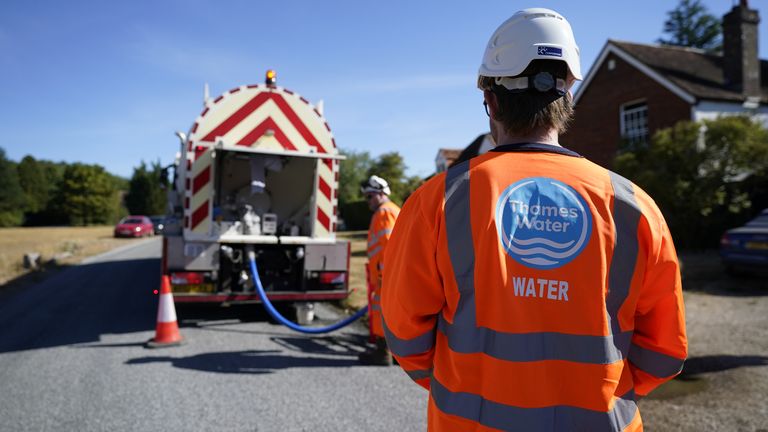
Water companies in England and Wales have been told they will not be allowed to impose the hikes to bills they have demanded, the industry regulator has said in an interim verdict on their business plans for the next five years.
Ofwat declared that it was minded to slash, by a third, the combined increases that the 16 companies had submitted.
It left the average bill, the watchdog said, set to rise by £19 a year or 21% over the period.
Ofwat chief executive David Black said: “Customers want to see radical change in the way water companies care for the environment.
Money latest:
Policy tweak could save you £295 on car insurance
“Our draft decisions on company plans approve a tripling of investment [to £88bn] to make sustained improvement to customer service and the environment at a fair price for customers.
A final ruling will be made in December.
All firms sought hefty increases to bills between 2025-30, with Southern Water leading the way with a proposed rise of almost 73%.
As Ofwat’s report suggested, their wishes – including the 42% hike demanded by crisis-hit Thames Water – are unlikely to be fully met following final consultations on the plans at a time when the industry is under such heavy fire from many sides.
It said companies’ business plans proposed increases averaging £144 over five years.
Thames Water’s proposed increase of £191 by 2030 had been reduced to £99, Ofwat said, while Severn Trent’s proposed increase of £144 had been reduced to £93.
The industry has long been accused of prioritising bonuses and shareholder dividends over investment in key infrastructure, systems that widely date back to the Victorian era.
Sky News revealed on Wednesday that the new environment secretary Steve Reed had summoned bosses for an urgent meeting, when his plans for tougher regulation will be spelled out later on Thursday.
These “initial steps” include customer panels to hold company boards to account and significantly higher financial penalties for failures.
Read more:
Thames Water pins survival hopes on Ofwat’s shoulders
Why water firms argue that higher bills are essential
Ofwat’s report stated that firms would face a target of reducing storm overflow spills to an average of 16 per year by 2029.
Environment Agency data showed discharges of untreated sewage in 2023 doubled from 1.8 million hours to a record 3.6 million.
The number of individual spills also soared by 54% to 464,000.
The data only covers the spills that were actually picked up and campaigners say the problem is far worse than has been acknowledged.
Both Thames and Southern were to face additional processes, Ofwat added, with the country’s biggest supplier set to come under a new oversight regime.
Thames Water covers 16 million customers and could yet have to be placed in a government-controlled special administration as investors in its parent company baulk over fresh investment demands due to Ofcom’s resistance on bill increases.
Thames effectively held a gun to the head of the regulator this week when it warned it would run out of cash by next May and would need a good business plan outcome to attract investors.









